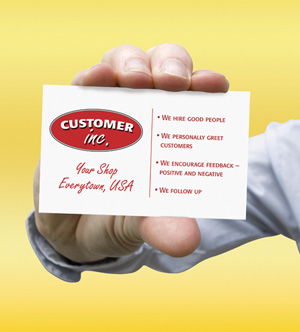 In the history of the world, the topic of customer service might not generate as much enthusiasm or interest as, say, global terrorism. But don’t tell that to a businessman – especially a tire dealer – who is battling a badly strained economy for his own survival in the marketplace.
In the history of the world, the topic of customer service might not generate as much enthusiasm or interest as, say, global terrorism. But don’t tell that to a businessman – especially a tire dealer – who is battling a badly strained economy for his own survival in the marketplace.
These days, businesses will “go the extra mile” to get a customer, make that sale or increase profit margins. In times where prices are extremely competitive and quality products often are difficult to differentiate across most vendors, businesses are focusing their energies on activities where the return on investment is more long-term. That center of activity includes concentrated efforts to keep existing customers and attract new ones. It’s called, among several things, “customer service.”
“Customer service,” “superior customer service” and “world-class customer service” are much more than overused industry buzzwords. Companies that treat their customers poorly are, expectedly, beginning to see their bases shrink. By the same measure, companies that have a well-bred focus on treating their customers like royalty know they can keep those customers, and maybe pick up more, by providing enhanced service, often with existing resources.
This trend, however, is not new.
Today, many companies spend billions of dollars on their public image and finding out how that image is impacted by their perceived or real dedication to the customer.
And while customer service involves far more than just employment, companies are making that investment. According to the U.S. Bureau of Labor Statistics, dedicated customer service representatives held about 2.2 million jobs in 2006, and were spread across a variety of industries, including finance, insurance, administrative and support services, employment services, retail trade establishments, telecommunications, manufacturing and wholesale trade.
Furthermore, the Labor Department predicts that “customer service representatives are expected to experience growth that is much faster than the average for all occupations” in the next 10 years. They expect a 25% growth rate by 2016, basing that prediction on the premise that “in many industries, gaining a competitive edge and retaining customers will be increasingly important over the next decade.”
A Tire Dealer’s Perspective
The tire industry is one that certainly recognizes the value of customer service. And dealers across the country, to varying degrees, have implemented and used customer service tactics. Some have been customer service superstars, others advance superior customer service efforts in dribs and drabs, with the expected effectiveness.
“The tire industry has always been a face-to-face business,” says Dick Erickson, owner of Sun Tire, based in Jacksonville, Fla. “And today, about 70% of my sales are face-to-face.”
While Erickson and his dealer comrades have espoused the tenets of superior customer service in the past, today’s economy and the increased usage of the Internet presents industry participants with different challenges. Some may disagree, but Erickson insists, “price is paramount in a majority of the sales today. It has never been more important. This changes your product mix and, as a result, your business model.”
Erickson estimates that 15% to 20% of his tire sales come from lower-priced tires. “When your customers are increasingly focused on price, you’ve got to do things that will help you differentiate yourself from your competition,” he says. “That’s why the focus on customer service is so important to us. It gives us the opportunity to set us apart from the rest.”
So even though a dealer may have a fancy printed “customer satisfaction” mission statement, plaque or certificate displayed in the storeroom, what are they really going to do in order to convince the customer that they mean business? And if the dedication is there, what works and what is a waste of time and effort when trying to please the customer?
“First of all, you need an internal atmosphere that ‘lives’ great customer service,” says Paul Chizeck, director of consumer tire education at Bridgestone Americas. “Very important to creating that atmosphere is defining great customer service and then teaching that to all involved.” Chizeck insists that an organization needs to build a culture that “lives great customer service.”
Studying Successful Models
With that objective in mind, Chizeck and Bridgestone took off down a different highway. They had lunch at a deli in Ann Arbor, Mich.
Zingerman’s Deli, opened in 1982 by Paul Saginaw and Ari Weinzweig in a historic building near the Ann Arbor Farmers’ Market, serves thousands of made-to-order sandwiches each year. These sandwich lunches can command $15 to $16 for such delicacies as corned beef, pastrami, free range chicken and turkey, homemade chopped liver or chicken salad. The deli also stocks an array of farmhouse cheeses, estate-bottled olive oils, varietal vinegars, smoked fish, salami, coffee, tea and more – but it doesn’t stock or sell tires.
So why did Bridgestone go to a deli to learn about customer service in the tire industry?
“We knew about their great customer service reputation,” says Chizeck. “One of our people, Darlene Gray, attended one of their seminars and was very impressed. She brought back a book entitled Guide to Giving Great Service. I’m not a big business book reader, but I read it and I thought Zingerman’s had some great ideas.”
So Chizeck and Bridgestone took that classic leap of faith and jumped onto the Zingerman’s deli wagon. They met with Maggie Bayless, managing partner of Zingtrain, the training element of Zingerman’s.
“Bridgestone sent a couple of people to one of our two-day seminars,” says Bayless, “and we shared with them what we have within our own organization. Then we customized a workshop for some of their tire dealers and showed them different tools, techniques, etc.”
To begin the process, Bayless gave them Zingerman’s five key elements of customer service:
1. Commitment to teaching
2. Define customer service
3. Live it – starting with the top of the organization
4. Measure results
5. Reward employees for good customer service
“It wasn’t rocket science,” Chizeck admits, “But they helped us develop our own key elements and then guided us through the process of implementing our plan – that was the hardest part.” With Zingerman’s template in hand, Bridgestone developed its own set of superior customer service steps they recently unveiled:
1. Welcome the customer
2. Put the customer at ease
3. Do the work right
4. Confirm the customer’s needs were met
5. Say thank you and go the extra mile
Bayless agrees with Chizeck in the simplicity of their guidelines. “There isn’t a magic pill or silver bullet,” she says. “These are small steps that push for improvement. They are only effective if a business is committed to them – from top to bottom – and they stick with them. That’s very important because you have to re-earn a customer’s trust with every interaction. Then your reputation will grow.”
Tim Chamberlin, district manager for eight Plaza Tire stores and a 33-year auto industry veteran, attended the Zingerman’s training and says, “It was good to experience that through someone else’s eyes. I think the best thing I got out of the training was just listening to the customer. I’ve dealt with some customers who tell me that they didn’t want more service; they just wanted to talk to somebody. They actually wanted less!”
One other thing Bayless mentioned is a commitment to hiring the right people, too. “We believe in the 5/95 rule,” she says. “Five percent of the workforce is made up of naturally born service providers. They came from a family business and they grew up in retail and understand what’s going on and who the customer is. Then there’s another 5% who will never get it. We look for the remaining 90% that can be taught.”
She adds, “We also have a ‘smile’ rule – we don’t hire anyone who doesn’t smile during an interview.”
Other Shining Examples
Then there’s Paul Sullivan of Sullivan Tire in New England, one of the nation’s most respected tire dealers. He says quite matter-of-factly, “Superior customer service begins with superior employees – people who are working for a career and not just a job.”
Who could argue with his success? The company has been in business for more than 50 years and Paul recognizes his own accountability to those words. “The responsibility, however, rests with the business owner who hires the employees – and it’s a two-way street. The owner has to give back, too. It’s no different than an athletic team. A coach can draw up all the right plays, but it’s the players who have to carry out those plays. Just like in sports, in business, it’s about fundamentals.
“In these tough economic times, you also have to compensate your employees fairly and offer them incentives to do good work and remain focused on the customer. It’s important to keep the employees happy, too. If they aren’t happy, there’ll be a disconnect with the customers.”
Fellow New Englander Barry Steinberg of Direct Tire also has an outside-the-box approach to customer service.
“We don’t benchmark other tire dealers or anyone in the tire industry,” he says. “Our benchmarks are Nordstrom’s and Neiman-Marcus, and I’ve also sent our guys to Best Buy and to restaurants. I ask them to find out what those businesses are doing right, wrong, better or worse than us. If it’s better, I want to find out how we can adopt that practice.”
Steinberg says his practices aren’t new. “Our focus hasn’t changed in 35 years, regardless of what goes on around us. Basically, I tell our employees that they should treat everyone like they’re your grandmother!”
Their grandmothers would be pleased with the unique service that Direct Tire, a 2008 Tire Review Top Shop Award finalist, offers its customers. “We have a fleet of 28 loaner cars that we lend to customers for free while they are having their car serviced,” says Steinberg. “If it inconveniences a customer to take his or her car away from them for a period of time, we’ll loan them a car. This is a very popular service for us. People call every day about it. This put us on the map.”
Steinberg adds the loaner car service is just an extension of his focus on personal service. “Money is tight right now, but people are willing to pay for sensational service. But they want value for their dollar. A product is a product is a product, but superior service sets you apart from your competition.”
Another added touch for Direct Tire is in its dedication to getting feedback from the customer. “One of the best things we do is put Post-It notes on every customer’s rear view mirror,” he says. “Basically, it’s doing two things: thanking them for their business and letting them know we want their input. I list my phone number and e-mail address on the note so they can get back to me at their convenience.”
Steinberg estimates that his four stores work on an average of 200 cars a day, and “we get about eight to 10 responses a day to our notes. Then I respond to each one of them – every day!”
The “personal” equation is just as popular in the commercial environment. Rick Stewart of Forest Park, Ga.-based Action Tire says his company “stays away from giveaways,” but focuses on service. “Just don’t leave your customer in the dark. We operate with the idea that customers want to deal with someone that they trust. Integrity is especially important in our business.”
A common thread throughout the patchwork quilt of customer service tips is not a dedication to a product or service, per se, but to people.
Melbourne, Fla.-based Gatto’s Tire has been in business since 1972. Founded by Mike Gatto, it is still family-owned and operated. Daughter Pam Gatto-Gallo is president and says the key to superior customer service is quite simple.
“Hire good people,” she says. “We look for well-groomed, well-spoken, polite, courteous and caring workers. Plus, they have to be honest and hard-working. Good customer relations start and end with our people. Building long-term relationships with customers so that they refer people to you is the easiest way to build a business.”
It was Gatto’s Tire & Auto Service’s single-minded customer service focus that drove it to win the 2007 Tire Review Top Shop Award.
Further, Pam said it’s important that workers feel comfortable with representing the company, especially in cases where the customer takes exception to something. “Empower your people to do whatever is necessary to handle a complaint,” she says. “We all make mistakes, but handling them fast and with the least amount of pain to the customer goes a long way toward keeping that customer. And often, a customer who’s had a problem – and you’ve admitted fault and fixed it immediately – will become more loyal to you.”
She insists, though, that you must first hire good people. “I even use that in our advertising,” she says. And why the focus on hiring versus training people to be customer focused? She offered, “If mama didn’t raise them to treat people well, YOU can’t do it now!”
Tire Review’s Fab Four Keys to Superior Customer Service:
1. Hire good people
2. Personally greet customers
3. Encourage feedback – positive and negative
4. Follow up. Follow up. Follow up.













